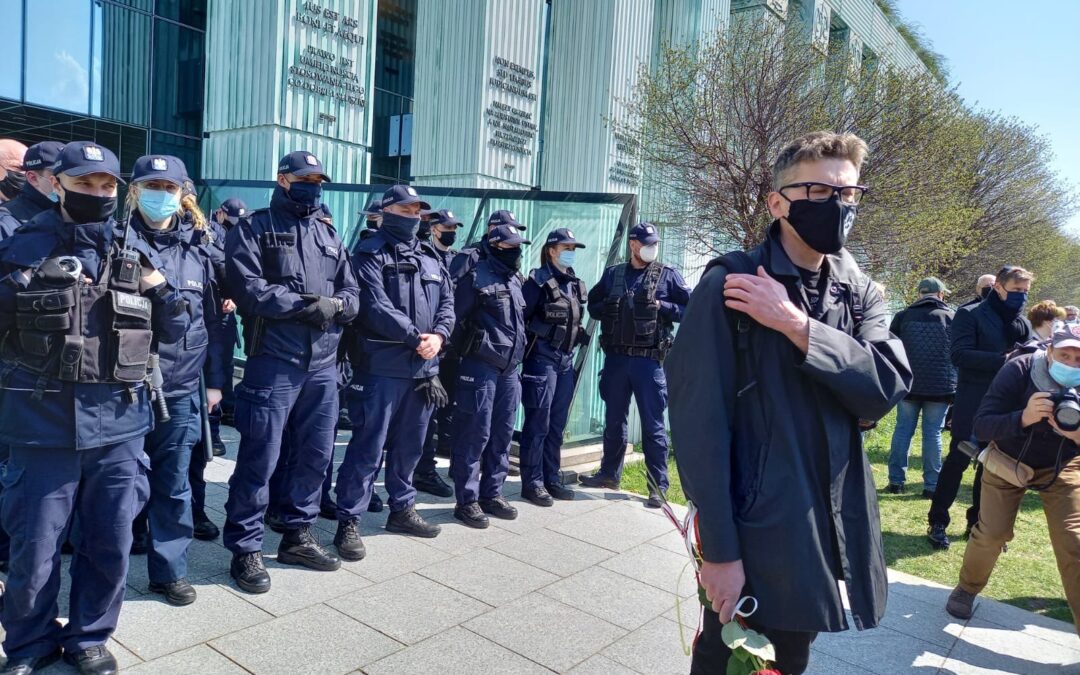The disciplinary chamber of Poland’s Supreme Court – a body created by the government and whose legitimacy has been rejected by the court itself – has denied a request by prosecutors to forcibly detain a judge who has been a leading critic of the government’s judicial policies.
In a long-running and widely watched case, judge Igor Tuleya has been accused by prosecutors of exceeding his powers and unlawfully disclosing information in a case in which he issued a ruling that effectively went against the government.
Last year, the same disciplinary chamber suspended Tuleya and stripped him of his immunity from prosecution. The judge has, however, subsequently refused to comply with summonses to face charges, and so prosecutors requested that he be detained by force.
Tuleya has refused to appear before the chamber, as he rejects its legitimacy. So do the Supreme Court – which found it “not to be a court [under] EU and national law” – and the Court of Justice of the European Union (CJEU), which ordered Poland’s new disciplinary regime for judges to be suspended.
Following two days of deliberation, in a decision announced after 11 p.m. on Thursday, the disciplinary chamber rejected the request by prosecutors to detain Tuleya after “considering matters of human freedom”. The decision can still be appealed.
“It is a small battle that we won, but the war to protect the rule of law continues,” said Tuleya, adding that he would “fight till the end”. He later told broadcaster TVN that “EU institutions have abdicated in Polish matters” and “would have the blood of Polish judges on their hands”.
Strong statement of Polish Ombudsman & @RaftoFoundation 2018 laureate @Adbodnar at #Igor Tuleya "trial": Where are the EU and CJEU? What else needs to be done to expect action? Seems that we, the people here, have to show the @EU_Commission how to defend #RuleOfLaw @NorwayMFA pic.twitter.com/JJZCGNAdga
— Iver Ørstavik (@iverorstavik) April 22, 2021
Poland’s commissioner for human rights, Adam Bodnar, who was last week the subject of a constitutional court ruling removing him from office, joined Tuleya in waiting for the verdict outside the Supreme Court on Thursday. “I ask, where are European institutions?” he told journalists at the scene.
The chamber’s ruling was, however, criticised by Krzysztof Sobolewski, the head of the ruling Law and Justice (PiS) party’s executive committee.
It sets “a very bad example” because “any other citizen would be brought for questioning by the police after [refusing] the second summons,” he said, quoted by TVP Info.
Sobolewski said that the ruling would encourage the ruling camp to hasten its “reform” of the judiciary, as if other judges refused to comply with summonses it could “lead to a paralysis of the judiciary”.
Opposition figures and some commentators, however, suggested that the ruling was the result of a political decision implemented by a body under the influence of the ruling party.
“The ruling camp did not want a scandal across the entire political world,” opposition MP Paweł Kowal told TVN24. “Images of a judge being taken out of his home” and into detention would further damage relations with Brussels and Washington, said Kowal.
The fact that such a sham process is occurring in what is ostensibly still a democracy founded on the rule of law is a matter for condemnation, whatever the ultimate political outcome.
— Ben Stanley (@BDStanley) April 22, 2021
The accusations against Tuleya stem from a ruling he made in 2017 to overturn a decision by prosecutors to discontinue an investigation into the potentially unlawful passing of the government’s annual budget by parliament.
The speaker of the lower house – who was from PiS – had ordered the vote to be held outside the normal chamber, because it was being occupied in a protest by opposition MPs.
After the vote, opposition MPs notified prosecutors of alleged restrictions on participation in the impromptu session and raised doubts as to whether the necessary quorum was achieved.
Prosecutors – who are under the ultimate authority of Zbigniew Ziobro, the prosecutor general and justice minister – decided to discontinue the case. But Tuleya overturned that decision, ruling they should proceed and also noting potentially false statements made by 230 MPs, mainly from the ruling coalition. The case was nonetheless discontinued once more by prosecutors in 2018.
Subsequently, prosecutors claimed that, by allowing journalists to attend and record his court proceedings, Tuleya had allowed the public disclosure of details of the case to unauthorised people. That served as grounds for launching criminal proceedings against him for exceeding his powers and unlawfully disclosing information.
After Tuleya did not appear on three occasions to face the charges, prosecutors have sought to have him detained and forcibly brought to trial. Tuleya and his supporters in the judicial community argue that he was entitled to make the hearing public. He says the charges against him are political.
Tuleya has been one of the most prominent judges to have protested against the government’s overhaul of the judicial system, which has been condemned as a violation of the rule of law by a wide range of international institutions and expert bodies.
"Judge Igor Tuleya has faced threats, fake anthrax attacks and denunciations in the right-wing news media as he fights the government’s campaign to control the courts"@nytimes #SaturdayProfile https://t.co/0u9qZSWsks
— Notes from Poland 🇵🇱 (@notesfrompoland) January 11, 2020

Maria Wilczek is deputy editor of Notes from Poland. She is a regular writer for The Times, The Economist and Al Jazeera English, and has also featured in Foreign Policy, Politico Europe, The Spectator and Gazeta Wyborcza.




















